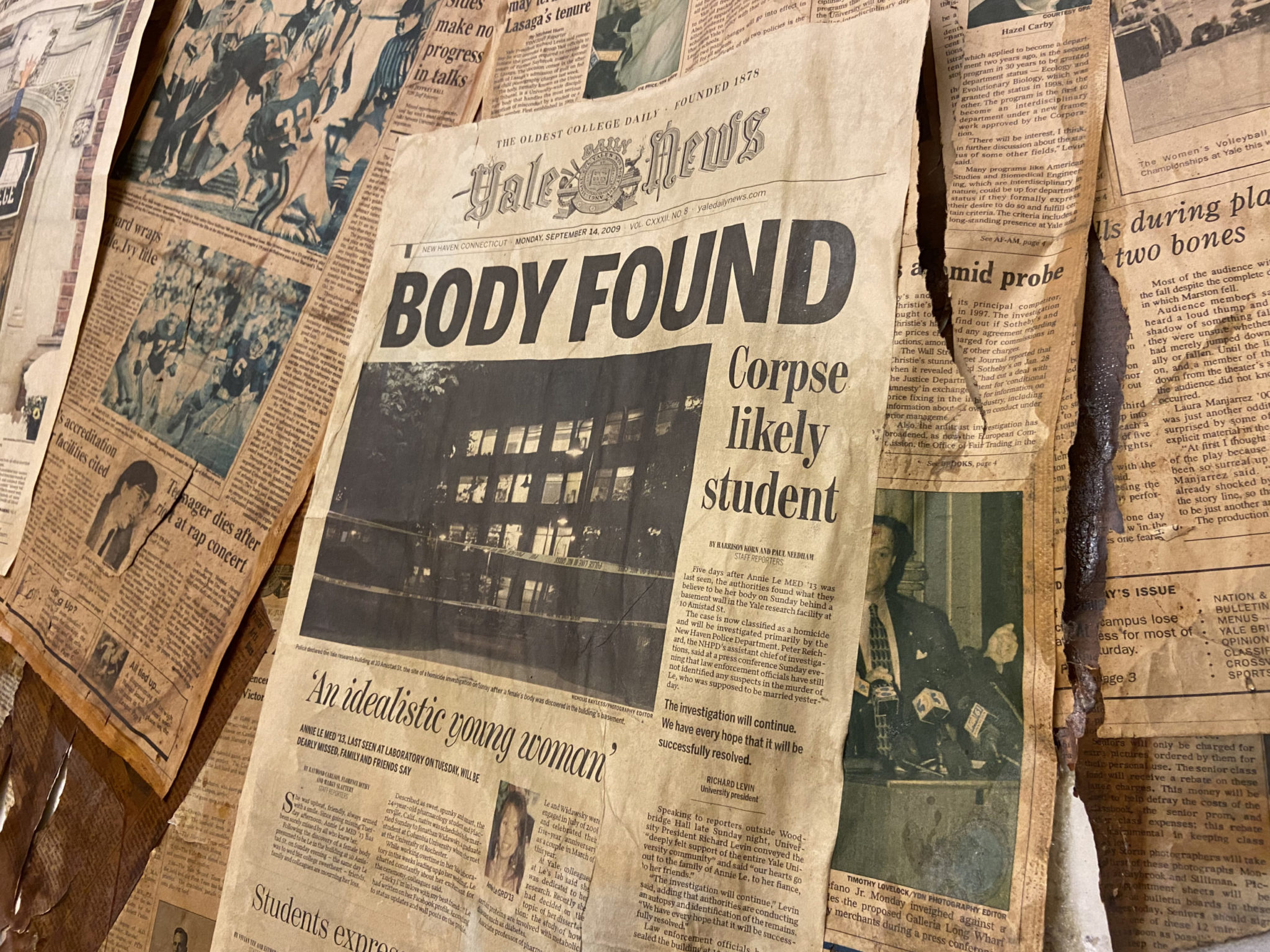Two podcasters explore murders within the Ivy League
Laura McDonald and Sarah Alcorn discuss some of the most horrific criminal cases related to Ivy League schools in their podcast “Ivy League Murders.”

Zoe Berg, Photo Editor
Two “crime-heads” joined forces to create a podcast in which they explore the dark side of the Ivy League — including the murders of Yale students.
Laura McDonald and Sarah Alcorn, a Harvard graduate, founded the podcast “Ivy League Murders,” in which they research, discuss and comment on violent crime on Ivy League campuses. The podcast was founded approximately a year ago, during the early days of the COVID-19 pandemic. The weekly episodes explore everything from murder, kidnappings and mystery, as well as power and privilege in the justice system; they invite listeners to take a closer look at what lurks beneath the surface in the Ivy League.
“Human nature does not care if you have an Ivy League degree,” McDonald said. “Greed, jealousy, lust — we see these characteristics in all socioeconomic groups.”
The podcast began as a passion project for both McDonald and Alcorn with 10 original cases, and has since grown into a weekly podcast which Spotify describes as an exposé of “the most haunting cases to spin out of some of America’s most elite corners.”
McDonald and Alcorn went to high school together at the Cambridge Rindge & Latin School in Cambridge, Massachusetts. Yet their paths never crossed, until about two and a half years ago, when Alcorn’s daughter asked to adopt a kitten; their search led them to McDonald’s door.
“As a [private investigator], I was the most crime-obsessed person I knew and then I met Laura, and she’s much more, or at least as much, of a crime-head than I am,” Alcorn said.
According to the two podcasters, McDonald had the idea for the podcast but wanted a partner to work with. Fittingly, Alcorn is a private investigator by trade; McDonald’s idea immediately caught her attention.
“She was the seed, I was the soil and [the podcast] grew,” Alcorn said.
According to the hosts, spending their childhoods in Cambridge, next to Harvard Square, led them to grow up with great curiosity as to what loomed behind the Ivy League gates.
Their shared passion for true crime then sparked further questions about the more nefarious happenings on Ivy League college campuses.
“It’s that curiosity that brought about this podcast,” McDonald said. “People think that being in a certain educational and economic status shields you from certain types of personalities or people.”
In fact, according to both hosts, the Ivy League schools are unique in that they provide a “pastiche of privilege,” and many assume that as a result, students at Ivy League schools are exempt from the horrors of violent crime.
However, the podcasters emphasized that this impression is false. With the research and the commentary they present in the podcast, Alcorn and McDonald demonstrate that students, alumni and affiliates of Ivy League schools are also afflicted by the same human faults of obsession, jealousy, greed and anger which may lead to violent crime. Indeed, the hosts outlined the podcast’s goal as being that of exposing these realities.
Alcorn told the News that finding these cases can be quite difficult as they are often hidden and court records are not easily accessible. She said that she spends a considerable amount of time “digging out” these cases before any of the production can even begin. However, she clarified that the cases are not necessarily hidden by the universities.
“The cases are hard to find,” McDonald said. “We have to dig to find them. We started with 10 cases, and we’ve grown up to 200. We also do sister schools occasionally.”
According to McDonald and Alcorn, interest in the podcast is not only limited to Ivy League students, alumni and affiliates, but also includes people around the world.
Both podcasters mentioned that the aura of exclusivity and mystery surrounding the eight Ivy League schools — with their selective admission processes — is often what piques listeners’ interest.
“People love to see kings fall,” McDonald said. “[They are] intrigued by people who seemingly have everything and throw it away because of human emotion.”
Their producing partner and manager, Zach Zoppa, also reiterated the importance of the “setting” of the podcast’s episodes.
He said that the podcast’s listeners often have many preconceived notions of Ivy League students. The podcast looks to subvert people’s expectations and place the crime genre on a “new level,” Zoppa said.
“It’s a very exotic setting; most people have never set foot on an Ivy League campus,” Zoppa said. “And we kind of have a set idea of who an Ivy Leaguer is. … The reality is that these cases are all so diverse. It’s people from all walks of life.”
According to Alcorn, the Ivy League framework for the podcast also influences the content of each episode.
More specifically, in keeping with the idea of intellectualism and academic excellence that is associated with the Ivy League schools, the podcasters said they try to work in some historical, social, political or literary context when describing each case — often leaving the gory details of the cases on the backburner.
“We try to work in elements of philosophy and literature and history depending on whatever the episode calls for,” Alcorn said. “We try to distinguish ourselves in an ‘Ivy League way,’ putting a little bit of intellectualism into true crime.”
The two hosts also shed light on a rther bizarre phenomenon when it comes to murder in the Ivy League, particularly in reference to the case of Richard Herrin ’75 and Bonnie Garland ’77. In 1977, Herrin bludgeoned Garland, his ex-girlfriend and then-senior at Yale, to death.
As the murder was being investigated, many supported Herrin, undermining the gravity of his actions, and expressing regret that such a brilliant man had thrown everything away.
“There is a rush to champion a lot of these people,” McDonald said. “They almost seem to be more valuable because of their education and their breeding. And so they seem to attract these champions, which is bizarre.”
According to McDonald and Alcorn, the case ended when Herrin was charged with manslaughter and ended up serving 17 years in jail. Garland’s supporters, however, were upset with the verdict because they considered the crime to be first-degree murder.
The podcast hosts said this case, along with others they discuss, reveals the ways in which “privilege can pervert justice.”
While many of the podcast’s murder cases come form the 20th century, the hosts also cover more recent crimes. One episode was dedicated to Kevin Jiang ENV ’22, who was murdered by Massachusetts Institute of Technology graduate student Qinxuan Pan in February.
Ivy League Murders currently has 67 episodes.









